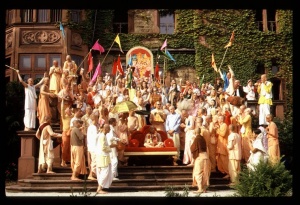CC Antya 3.56: Difference between revisions
m (1 revision(s)) |
(Vanibot #0054 edit - transform synonyms into clickable links, which search similar occurrences) |
||
| (One intermediate revision by one other user not shown) | |||
| Line 1: | Line 1: | ||
{{ | [[Category:Sri Caitanya-caritamrta - Antya-lila Chapter 03|C056]] | ||
<div style="float:left">'''[[Sri Caitanya-caritamrta|Śrī Caitanya-caritāmṛta]] - [[CC Antya|Antya-līlā]] - [[CC Antya 3|Chapter 3: The Glories of Śrīla Haridāsa Ṭhākura]]'''</div> | |||
<div style="float:right">[[File:Go-previous.png|link=CC Antya 3.55|Antya-līlā 3.55]] '''[[CC Antya 3.55|Antya-līlā 3.55]] - [[CC Antya 3.57|Antya-līlā 3.57]]''' [[File:Go-next.png|link=CC Antya 3.57|Antya-līlā 3.57]]</div> | |||
{{CompareVersions|CC|Antya 3.56|CC 1975|CC 1996}} | |||
{{RandomImage}} | |||
==== TEXT 56 ==== | ==== TEXT 56 ==== | ||
<div class="verse"> | |||
<div | :daṁṣṭri-daṁṣṭrāhato mleccho | ||
daṁṣṭri-daṁṣṭrāhato mleccho | :hā rāmeti punaḥ punaḥ | ||
hā rāmeti punaḥ punaḥ | :uktvāpi muktim āpnoti | ||
uktvāpi muktim āpnoti | :kiṁ punaḥ śraddhayā gṛṇan | ||
kiṁ punaḥ śraddhayā gṛṇan | |||
</div> | </div> | ||
| Line 15: | Line 18: | ||
==== SYNONYMS ==== | ==== SYNONYMS ==== | ||
<div class="synonyms"> | |||
<div | ''[//vanipedia.org/wiki/Special:VaniSearch?s=daṁṣṭri&tab=syno_o&ds=1 daṁṣṭri]'' — of a boar; ''[//vanipedia.org/wiki/Special:VaniSearch?s=daṁṣṭra&tab=syno_o&ds=1 daṁṣṭra]'' — by the teeth; ''[//vanipedia.org/wiki/Special:VaniSearch?s=āhataḥ&tab=syno_o&ds=1 āhataḥ]'' — killed; ''[//vanipedia.org/wiki/Special:VaniSearch?s=mlecchaḥ&tab=syno_o&ds=1 mlecchaḥ]'' — a meat-eater; ''[//vanipedia.org/wiki/Special:VaniSearch?s=hā&tab=syno_o&ds=1 hā] [//vanipedia.org/wiki/Special:VaniSearch?s=rāma&tab=syno_o&ds=1 rāma]'' — “O my Lord Rāma”; ''[//vanipedia.org/wiki/Special:VaniSearch?s=iti&tab=syno_o&ds=1 iti]'' — thus; ''[//vanipedia.org/wiki/Special:VaniSearch?s=punaḥ&tab=syno_o&ds=1 punaḥ] [//vanipedia.org/wiki/Special:VaniSearch?s=punaḥ&tab=syno_o&ds=1 punaḥ]'' — again and again; ''[//vanipedia.org/wiki/Special:VaniSearch?s=uktvā&tab=syno_o&ds=1 uktvā]'' — saying; ''[//vanipedia.org/wiki/Special:VaniSearch?s=api&tab=syno_o&ds=1 api]'' — even; ''[//vanipedia.org/wiki/Special:VaniSearch?s=muktim&tab=syno_o&ds=1 muktim]'' — liberation; ''[//vanipedia.org/wiki/Special:VaniSearch?s=āpnoti&tab=syno_o&ds=1 āpnoti]'' — gets; ''[//vanipedia.org/wiki/Special:VaniSearch?s=kim&tab=syno_o&ds=1 kim]'' — what; ''[//vanipedia.org/wiki/Special:VaniSearch?s=punaḥ&tab=syno_o&ds=1 punaḥ]'' — again; ''[//vanipedia.org/wiki/Special:VaniSearch?s=śraddhayā&tab=syno_o&ds=1 śraddhayā]'' — with faith and veneration; ''[//vanipedia.org/wiki/Special:VaniSearch?s=gṛṇan&tab=syno_o&ds=1 gṛṇan]'' — chanting. | ||
</div> | </div> | ||
| Line 23: | Line 25: | ||
==== TRANSLATION ==== | ==== TRANSLATION ==== | ||
<div class="translation"> | |||
<div | |||
“‘Even a mleccha who is being killed by the tusk of a boar and who cries in distress again and again, “hā rāma, hā rāma” attains liberation. What then to speak of those who chant the holy name with veneration and faith?’ | “‘Even a mleccha who is being killed by the tusk of a boar and who cries in distress again and again, “hā rāma, hā rāma” attains liberation. What then to speak of those who chant the holy name with veneration and faith?’ | ||
</div> | </div> | ||
| Line 30: | Line 31: | ||
==== PURPORT ==== | ==== PURPORT ==== | ||
<div class="purport"> | |||
This refers to an instance in which a meat-eater being killed by a boar uttered the words ''hā rāma, hā rāma'' again and again at the time of his death. Since this is a quotation from the ''Nṛsiṁha Purāṇa'', this indicates that in the purāṇic age there must also have been mlecchas and yavanas (meat-eaters), and the words hā rāma, meaning “condemned,” were also uttered in those days. Thus Haridāsa Ṭhākura gives evidence that even a meat-eater who condemns something by uttering the words ''hā rāma'' gets the benefit of chanting the holy name that the devotee chants to mean “O my Lord Rāma!” | |||
</div> | |||
<div | <div style="float:right; clear:both;">[[File:Go-previous.png|link=CC Antya 3.55|Antya-līlā 3.55]] '''[[CC Antya 3.55|Antya-līlā 3.55]] - [[CC Antya 3.57|Antya-līlā 3.57]]''' [[File:Go-next.png|link=CC Antya 3.57|Antya-līlā 3.57]]</div> | ||
__NOTOC__ | |||
</div> | __NOEDITSECTION__ | ||
__NOTOC__ | |||
Latest revision as of 20:28, 19 February 2024

A.C. Bhaktivedanta Swami Prabhupada
TEXT 56
- daṁṣṭri-daṁṣṭrāhato mleccho
- hā rāmeti punaḥ punaḥ
- uktvāpi muktim āpnoti
- kiṁ punaḥ śraddhayā gṛṇan
SYNONYMS
daṁṣṭri — of a boar; daṁṣṭra — by the teeth; āhataḥ — killed; mlecchaḥ — a meat-eater; hā rāma — “O my Lord Rāma”; iti — thus; punaḥ punaḥ — again and again; uktvā — saying; api — even; muktim — liberation; āpnoti — gets; kim — what; punaḥ — again; śraddhayā — with faith and veneration; gṛṇan — chanting.
TRANSLATION
“‘Even a mleccha who is being killed by the tusk of a boar and who cries in distress again and again, “hā rāma, hā rāma” attains liberation. What then to speak of those who chant the holy name with veneration and faith?’
PURPORT
This refers to an instance in which a meat-eater being killed by a boar uttered the words hā rāma, hā rāma again and again at the time of his death. Since this is a quotation from the Nṛsiṁha Purāṇa, this indicates that in the purāṇic age there must also have been mlecchas and yavanas (meat-eaters), and the words hā rāma, meaning “condemned,” were also uttered in those days. Thus Haridāsa Ṭhākura gives evidence that even a meat-eater who condemns something by uttering the words hā rāma gets the benefit of chanting the holy name that the devotee chants to mean “O my Lord Rāma!”